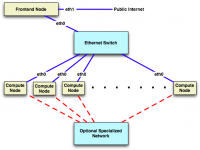Difference between revisions of "RockCluster: Kebutuhan Hardware"
Onnowpurbo (talk | contribs) (New page: Processors * x86 (ia32, AMD Athlon, etc.) * x86_64 (AMD Opteron and EM64T) Networks * Ethernet Note Specialized networks and components (e.g., Myri...) |
Onnowpurbo (talk | contribs) |
||
| (7 intermediate revisions by the same user not shown) | |||
| Line 1: | Line 1: | ||
| − | + | ==Processor== | |
| − | + | * x86 (ia32, AMD Athlon, etc.) | |
| + | * x86_64 (AMD Opteron dan EM64T) | ||
| − | + | ==Network== | |
| − | |||
| − | + | * Ethernet | |
| − | + | ==Kebutuhkan Hardware Minimal== | |
| − | + | ===Frontend Node=== | |
| − | + | * Kapasitas Harddisk : 30 GB | |
| + | * Kapasitas Memory : 1 GB | ||
| + | * Ethernet : 2 port fisik (eth0 dan eth1) | ||
| + | * Urutan Boot BIOS : CD, Hard Disk | ||
| − | + | ===Compute Node=== | |
| − | + | * Kapasitas Harddisk : 30 GB | |
| − | + | * Kapasitas Memory : 1 GB | |
| + | * Ethernet : 1 port fisik (eth0) | ||
| + | * Urutan Boot BIOS : CD, PXE (Network Boot), Hard Disk | ||
| − | + | ==Instalasi Fisik== | |
| − | + | Banyak buku yang membahas tentang bentuk fisik cluster. Kebanyakan buku dari O'Reilly tentang "Building Linux Clusters" membahas setup fisik cluster, cara memilih motherboard dll. Buku "How to Build a Beowulf" memuat tip yang baik tentang konstruksi fisik cluster. | |
| − | + | Akan lebih baik menggunakan peralatan rack-mount karena lebih reliable dan lebih padat.Akan tetapi ada juga Rocks Cluster yang dibangun menggunakan mini tower. Pada akhirnya silahkan kita pilih mana yang lebih baik buat kita. | |
| − | |||
| − | + | Diagram berikut memperlihatkan bagaimana frontend dan compute node harus tersambung: | |
| − | |||
| − | + | [[Image:Cluster.png|center|200px|thumb]] | |
| − | |||
| − | |||
| − | |||
| − | |||
| − | |||
| − | |||
| − | |||
| − | |||
| − | |||
| − | |||
| − | |||
| − | |||
| − | |||
| − | |||
| − | |||
| − | |||
| − | |||
| − | |||
| − | |||
| − | |||
| − | |||
| − | |||
| − | |||
| − | |||
| − | |||
| − | |||
| − | |||
| − | |||
| − | |||
| − | |||
| − | |||
| − | |||
| + | Pada compute node, interface Ethernet eth0 tersambung ke cluster ethernet switch. Jaringan ini termasuk jaringan private, dimana semua traffic terpisah dari jaringan public / external / [[Internet]]. | ||
| + | Pada frontend dibutuhkan paling tidak dua (2) interface ethernet. Ethernet eth0 harus tersambung ke jaringan dimana compute nodes tersambung. Interface eth1 tersambung ke jaringan luar, seperti, IntraNet atau Internet. | ||
==Referensi== | ==Referensi== | ||
| Line 72: | Line 45: | ||
* [[RockCluster]] | * [[RockCluster]] | ||
| + | * [[RockCluster: Kebutuhan Hardware]] | ||
| + | * [[RockCluster: Instalasi]] | ||
| + | * [[RockCluster: Instalasi Compute Node]] | ||
| + | * [[RockCluster: Web Server Lokal]] | ||
| + | * [[RockCluster: Submit Job]] | ||
| + | * [[RockCluster: Administrasi Pemakaian]] | ||
Latest revision as of 17:25, 24 July 2011
Processor
- x86 (ia32, AMD Athlon, etc.)
- x86_64 (AMD Opteron dan EM64T)
Network
- Ethernet
Kebutuhkan Hardware Minimal
Frontend Node
- Kapasitas Harddisk : 30 GB
- Kapasitas Memory : 1 GB
- Ethernet : 2 port fisik (eth0 dan eth1)
- Urutan Boot BIOS : CD, Hard Disk
Compute Node
- Kapasitas Harddisk : 30 GB
- Kapasitas Memory : 1 GB
- Ethernet : 1 port fisik (eth0)
- Urutan Boot BIOS : CD, PXE (Network Boot), Hard Disk
Instalasi Fisik
Banyak buku yang membahas tentang bentuk fisik cluster. Kebanyakan buku dari O'Reilly tentang "Building Linux Clusters" membahas setup fisik cluster, cara memilih motherboard dll. Buku "How to Build a Beowulf" memuat tip yang baik tentang konstruksi fisik cluster.
Akan lebih baik menggunakan peralatan rack-mount karena lebih reliable dan lebih padat.Akan tetapi ada juga Rocks Cluster yang dibangun menggunakan mini tower. Pada akhirnya silahkan kita pilih mana yang lebih baik buat kita.
Diagram berikut memperlihatkan bagaimana frontend dan compute node harus tersambung:
Pada compute node, interface Ethernet eth0 tersambung ke cluster ethernet switch. Jaringan ini termasuk jaringan private, dimana semua traffic terpisah dari jaringan public / external / Internet.
Pada frontend dibutuhkan paling tidak dua (2) interface ethernet. Ethernet eth0 harus tersambung ke jaringan dimana compute nodes tersambung. Interface eth1 tersambung ke jaringan luar, seperti, IntraNet atau Internet.
